Concrete densifiers are chemically reactive sealers that work entirely below the surface to create a permanent crystalline barrier within the pores. Densifiers are primarily used to increase the strength and density of the concrete in order to reduce dusting and deterioration caused by surface abrasion.
The two most popular types of densifiers are sodium silicate densifiers and lithium silicate densifiers. Silicate densifiers have a larger molecule and are primarily used on porous concrete, while lithium silicates have a smaller molecule and are primarily used on dense concrete.
Lithium Silicate Concrete Densifier Reviews:
- Armor L3000 Concrete Sealer Review (concentrated)
- PS103 Concrete Sealer Review (pre-diluted)
- Lion Hard Concrete Sealer Review (pre-diluted)
Sodium Silicate Concrete Densifier Reviews:
- Armor S2000 Concrete Sealer Review (concentrated)
- RadonSeal Concrete Sealer Review (pre-diluted)
- Stone Technolgies X-1 Concrete Sealer Review (pre-diluted)
- Ashford Formula Concrete Sealer Review (pre-diluted)
How Densifiers Work
Silicate densifiers penetrate anywhere from 1/8″-4″ into the concrete depending on the porosity of the concrete. They chemically react to form calcium silicate hydrate (C-S-H) within the pores. The structure reduces the size of the pores, therefore increasing the density and surface strength of the concrete.
Sodium and lithium silicate sealers work the same. They spark a chemical reaction in the concrete and once that chemical reaction has taken place, all that is left in the pores is the result of that chemical reaction.
Not To Be Confused
Densifiers are not to be confused with water repellent sealers. Densifiers are used to increase the strength and density of the concrete, but they won’t cause water and other liquids to bead off the surface. Water repellent sealers are the only type of sealer that will reduce water absorption on the surface in order to reduce staining and deterioration caused by water absorption. For more information about the differences, view Silicate Densifiers vs Water Repellent Sealers.

